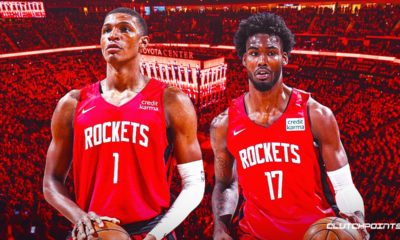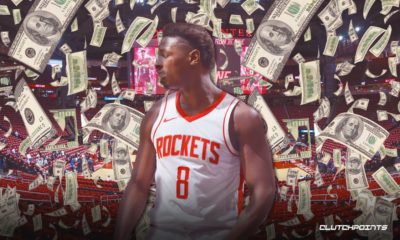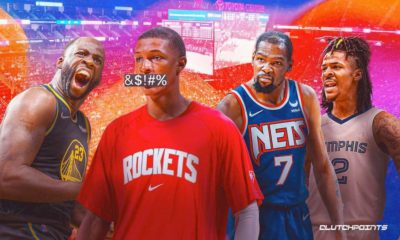Rockets
Rockets Math Can’t Solve For Warriors Kevin Durant
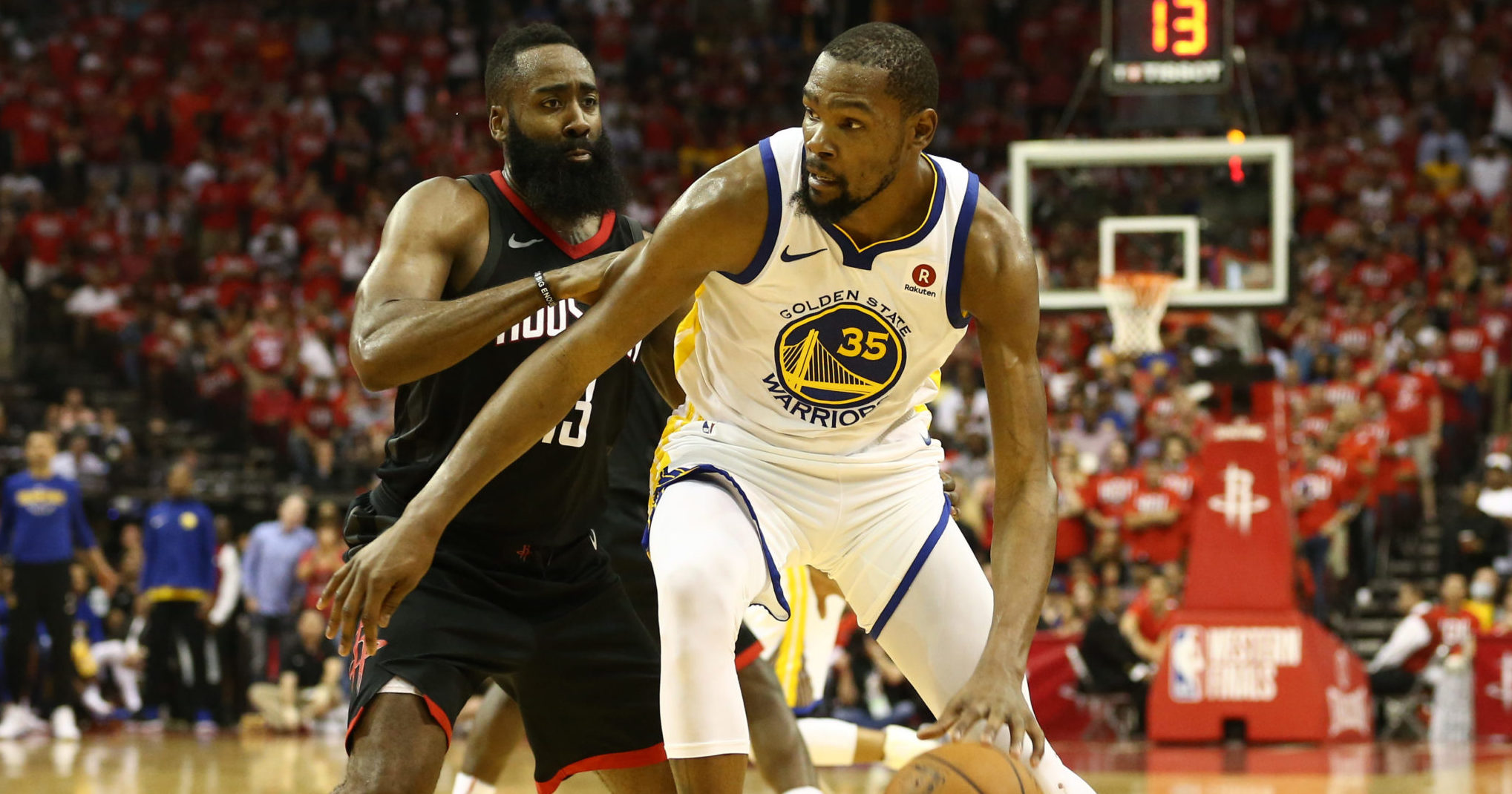

HOUSTON — The Houston Rockets fought all year for this moment, spending countless hours to lift itself to a championship pedigree.
Houston thought it was prepared. Importing the craftiest, most well-rounded point guard in NBA history, 65 wins, and a point differential over 8.0 will give a team all the hope in the world. The Rockets’ veterans thought they had all the correct answers and counters to ace the test.
It didn’t long for Kevin Durant and the Golden State Warriors to turn all of it on its head.
For what feels like the hundredth time, the Warriors brought everyone back to reality in Game 1. Contrary to Houston, they were holding out until this moment. Golden State’s 119-106 victory on the road automatically shifted the pulse of this series, which the Rockets were favored to win due to homecourt and regular season metrics.
Last night, the Rockets played well enough offensively to win on most random nights. But on most random nights, Houston isn’t playing a locked in Golden State team.
There’s just no practice simulation to help adequately prepare for Kevin Durant. With multiple defenders thrown his way — longer, more physical disrupters than he’s had to face in the last two playoff runs — Durant exhibited what makes him, perhaps, the most unguardable player in the NBA. He poured in 37 points on 14-of-27 shooting. He wasn’t asked to do much else, mainly because this Warriors unit is stacked enough to have everyone fill in the “dirty work” areas. Durant had just three rebounds and one assist, but keeping his turnover total to one was all that mattered in this matchup.
It was primarily a mid-range and paint area attack for Durant, who did most of his scoring damage against James Harden (sometimes on a defensive switch), and P.J. Tucker.
Kevin Durant goes to work in #PhantomCam! #DubNation #NBAPlayoffs pic.twitter.com/1LdXiS3mRP
— NBA (@NBA) May 15, 2018
In a game where both teams were constantly hunting mismatches and forcing Houston’s weakest defensive links into the pick-and-roll, the Warriors were smart to get Durant away from Trevor Ariza and Luc Mbah a Moute as much as possible. They only defended Durant for 11 of the 80 total possessions he played on the court.
When Durant was guarded by Tucker or Harden, the combination of his difficult shot-making and drawing help side defense led to Golden State’s absurd efficiency. They scored 59 points on the 45 possessions that Tucker or Harden were matched up with Durant, which is an offensive rating of 131.1 — almost 19 points per-100 possessions higher than their league-leading mark during the regular season.
“I mean, he’s seven-feet tall and falling away, and he’s one of the best scorers ever,” Rockets’ head coach Mike D’Antoni said. “I thought (Tucker) did all he could do, (Ariza) did all he could do, and I thought (Capela) guarded really well. He’s just that good.”
Durant took 18 of his shots from the mid-range and short-mid area (inside the paint, but not at the rim). It was the Rockets’ gameplan to eliminate most of the restricted area opportunities for Durant and others, forcing the Warriors into long twos and contested threes. To some degree, it worked, at least for certain stretches of the game. Only 22 percent of the Warriors’ shots came at the rim. That frequency would’ve been in the third percentile of games from the regular season.
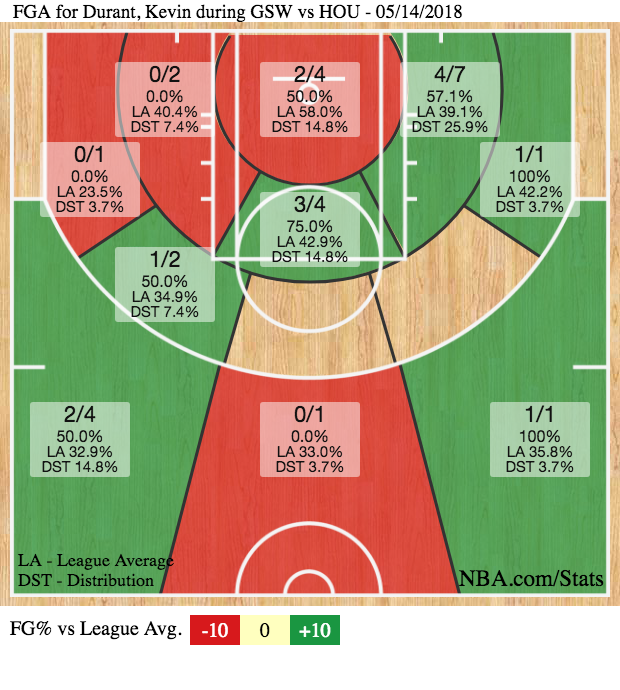
Kevin Durant’s Game 1 shot chart, per NBA.com
However, there were far too many defensive lapses in concentration and communication to execute that plan for all four quarters, which is the main problem teams have against Golden State.
Harden has been targeted by Warriors offense. Nice slip pic.twitter.com/5OfwRmZVk7
— BBALLBREAKDOWN (@bballbreakdown) May 15, 2018
You can build a double-digit lead against them in the first half, but a certain amount of fear must set in at halftime, realizing the third quarter is when they unleash the venom. In 93 third quarters this year (playoffs included), the Warriors have outscored opponents by 440 points. The next closest team? Houston, at plus-195 total in third quarters.
On top of having Durant score on him in a variety of ways, Harden struggled defensively on the perimeter. He was one of the leading causes of Golden State hitting 9-of-14 “wide-open” threes, which is defined as having at least six feet of space between the shooter and closest defender.
Harden would start some possessions guarding Draymond Green, who would screen Curry or Durant’s man and allow a switch to happen. His perimeter containment was easily broken, and the domino effect of help-side rotations is that someone is left open:
Klay Thompson was the beneficiary of Curry’s playmaking in the first half, as well as the load of attention Durant was requiring in isolation. He scored 28 points on 18 shots, with 15 of them coming from three-point range. It was the 10th time of his career that he’s hoisted at least 15 threes, but only the second time in the playoffs.
Thompson shot 7-of-14 on uncontested shots in general, with 14 being far too many for the Rockets to allow and expect to win.
“A bunch of it is communication,” Tucker said. “I feel like I say it all the time, it’s the key especially with (Golden State). You got to communicate. A lot of letdowns on switches, giving up a lot of shots in transition, not getting back. That’s the number one thing on our board that we have to do.”
While Houston only gave up 18 transition points, they came in crucial moments, or turning points, of the game and felt like backbreakers:
This wasn’t even a traditional Warriors game offensively, from a ball movement standpoint. They passed 283 times, which is about 40 fewer than usual during the playoffs. But when Durant is cooking at such a scorching temperature, you have to adjust to what’s working. Durant’s usage rate in Game 1 was 37 percent, compared to his 28.9 percent in the five-game series with New Orleans. It’s clear this series, with the way Houston has versatile, switchable lineups, will require Durant to tap into his Oklahoma City days to score in one-on-one situations.
If the Warriors can’t break the defense with their motion and off-ball cutting, it will essentially be a pick-and-roll series, except without the traditional way of attacking — getting downhill after a hedge, and baiting the defense to rotate off shooters. If there’s nothing but switching, both teams will find themselves in late shot-clock possessions, and then it’s up to Durant and Harden to generate something off-the-dribble.
About the only thing Houston could do in most of these possessions was beg for taller players:
“You know how we play, we want to keep the ball moving, but obviously (Durant) is the ultimate luxury,” Warriors’ head coach Steve Kerr said. “Because a play can break down, and you just throw him the ball. And he can get you a bucket as well as anyone on Earth. This is why anyone would want him on their team. I don’t know what you do to guard him.”
D’Antoni was adamant after the game that while Houston can live with Durant taking (and making) improbable shots, one thing they can’t afford is to make so many mistakes based off communication. Whether it was being confused about who was matching up with who in transition, or two players not being on the same page in terms of switching upon the screen, they gifted the Warriors with too many easy ones.
Here, during the first quarter when Houston was trying to pull away, they aren’t connected defensively with what the matchups are. Tucker is supposed to have Durant, but both Eric Gordon and Mbah a Moute drop down to cover Kevon Looney. Tucker has to step up and stop the ball, which in turn gets him burned:
Again, right out of halftime, Tucker and Ariza fail to execute a switch and leave Durant open for three. As soon as Tucker sees Curry coming down, he drops back to switch on to him. Ariza assumes Tucker will fight through, and he sticks with Curry. That gives Durant all the space he needs:
This next one is a double whammy, in a seven-point game with four minutes left. The Warriors’ death lineup is so fast and transition-oriented, there’s just no way Houston will be able to limit them during any up-tempo stretch or quarter this series:
As mentioned in our West Finals Preview, a fastbreak with Durant pushing as the ball-handler and the two greatest shooters of all-time running to the wing/corner is hellacious. They are already leaking out once the shot goes up, plus four Rockets (Ariza, Tucker, Harden, Capela) are planted so deep on the other end, it’s a handful to get back in time. The most important thing is to stop the ball, but it’s a lose-lose scenario when Curry is left wide open.
He missed the transition three, but an offensive rebound gave the Warriors another opportunity. As you can see above, Draymond Green cuts down the lane precisely when Tucker turns his back. That leads to Capela rotating over, then Tucker panicking once he realizes Green could be open. It’s a simple touch-pass to an open Thompson, who Green knew would be on the left wing. Miscommunication is essentially suicide against Golden State.
The Warriors’ death lineup (Curry-Thompson-Iguodala-Durant-Green) played 17 minutes in Game 1. While it only outscored Houston by two points, it was extremely effective at dictating the pace of the game. They managed to force six turnovers with steals, and got to the foul line 14 times in those 17 minutes of play. Houston had zero answers — it was either watch Durant bludgeon them, put league-leading free throw shooters on the line, or hope they missed.
Postseason play has been quite the cruise for this team since Durant joined in 2016. Golden State is 25-3 in its last 28 playoff games, dating back to last June, with one loss apiece to Cleveland, San Antonio, and New Orleans.
“We’ve put together a solid run, but we want to continue to be greedy and go after more,” Curry said.
The Rockets’ isolation style and identity helped them cruise to their best record in franchise history, and the number one seed for the first time. They were banking on both of those mattering in the postseason. Any other opponent in the league would get hosed by Harden and Paul’s one-on-one attacks, and leave shooters wide open to overcompensate.
Golden State’s defensive personnel just happens to be the one major roadblock in Houston’s path. Not only is their roster set up in such a manner to withstand and contest the Rockets’ favorite type of shots, but they are intelligent enough to know when to adjust and what type of punch to throw back at them on the offensive end. A lot of teams can check one of those boxes. Twenty eight teams, however, can’t do both.
“I don’t know if we’re even at our peak,” Durant said. “I think we could be better.”
With the Rockets already facing a 1-0 deficit and needing to win at least once in Oakland, they need to pray that’s not the case.
*All stats via NBA.com.*
The post Rockets Math Can’t Solve For Warriors Kevin Durant appeared first on ClutchPoints.






